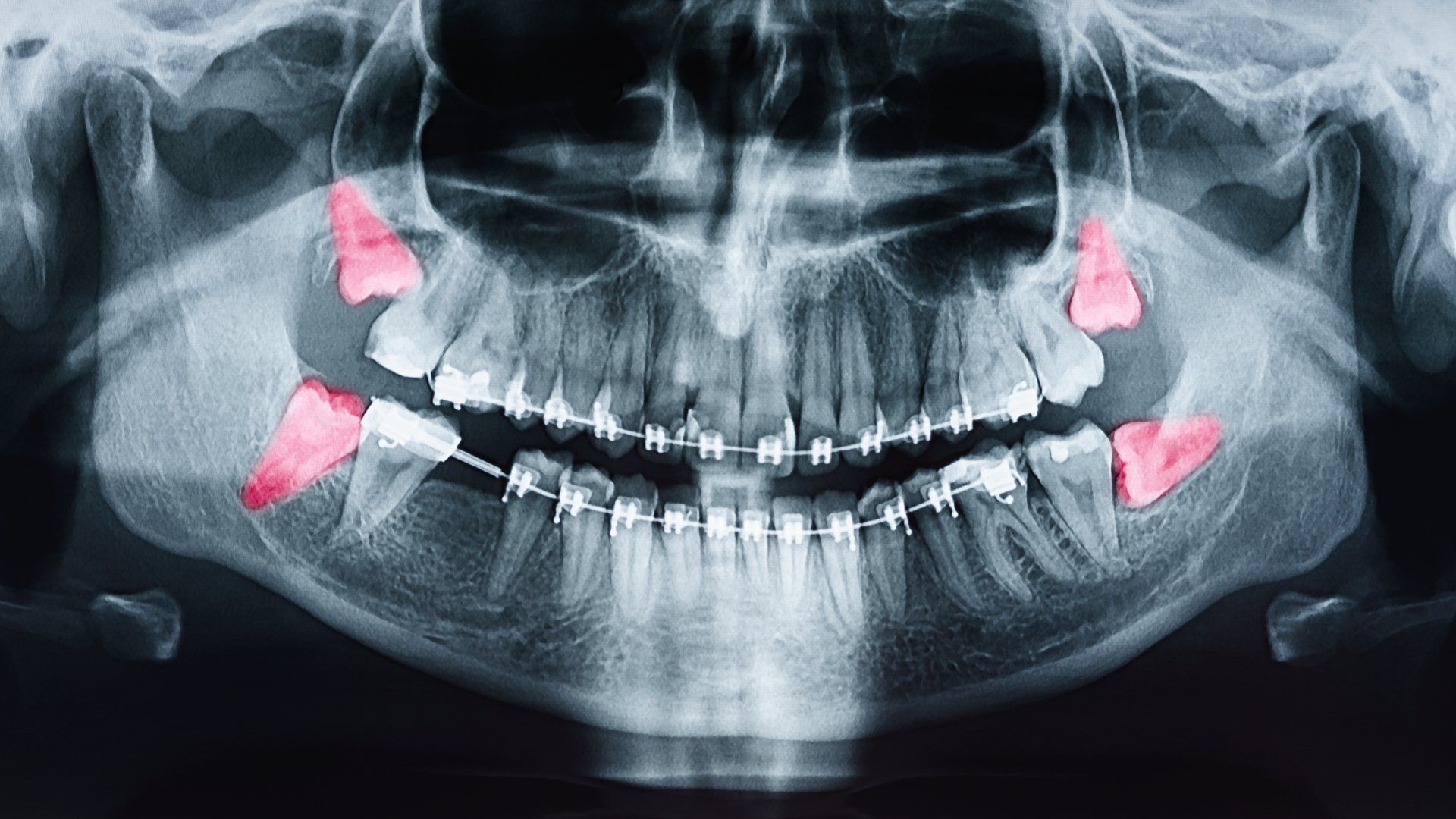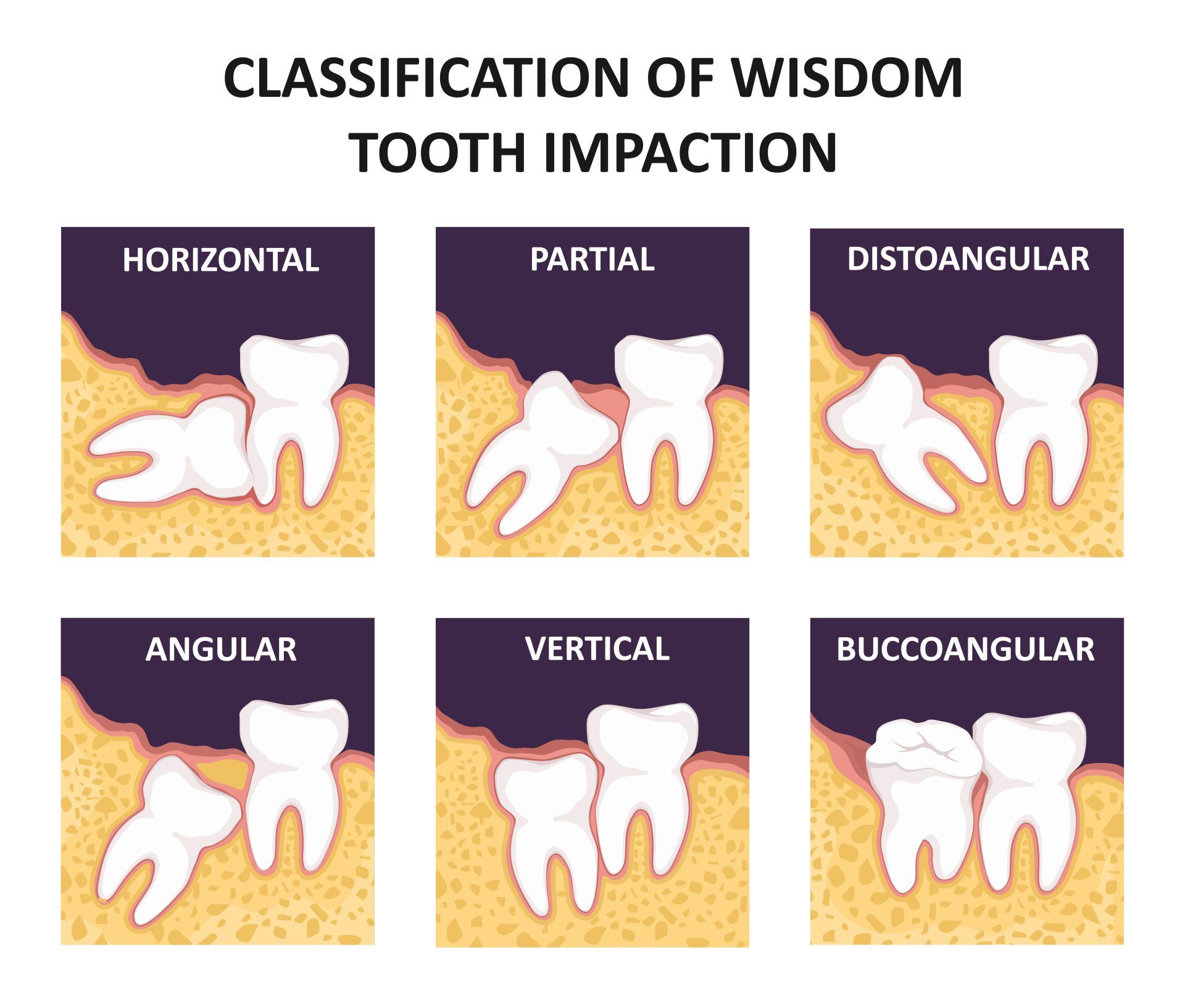Call us for any questions
Call Us!
Wisdom Teeth rEMOVAL
Do you have wisdom tooth pain? Our highly trained dentist removes wisdom teeth in Port St. Lucie. We can help you get out of pain or discomfort in a comfortable, caring and relaxing environment. At your appointment, we will take a panoramic x- ray to determine if you need a wisdom tooth extraction(s) and provide you with an individualized plan.
Wisdom teeth extractions are a fairly common procedure due to a variety of issues they cause as they try to protrude through the gums.
Wisdom teeth usually begin to erupt around ages 16-25.
Wisdom teeth can erupt fully, partially erupt (which often cause issues with cleaning and decay), or stay fully impacted (under the gums).
Impacted wisdom teeth means the tooth is coming in at an angle and not straight through the gum line. This can cause pain, the tooth can come in unevenly, or the tooth may only emerge partially.
When a wisdom tooth only partially erupts, a flap of skin, may form over the tooth. This generally makes the tooth hard to clean because small pieces of food can get caught under the flap leading to infection, swelling or pain.
When a tooth remains impacted it may start to push the teeth in front causing pain, bleeding, and extreme discomfort.


Common wisdom teeth symptoms that may indicate you need your wisdom teeth removed:
- Jaw pain and/or pain the the back of mouth
- Red, swollen, bleeding gums
- Swelling around the jaw
- Bad breath or bad taste in your mouth
- Difficulty opening your mouth
- Infection
- Teeth crowding
What to expect when you get your wisdom teeth removed.
- Have a panoraomic xray and exam with your dentist to review your wisdom teeth and evaluate options for removal.
- Decide if you would like any level of sedation. We offer oral conscious sedation & nitrous laughing gas. For Oral Conscious sedation you will need a driver to and from your appointment.
- A Surgical procedure which will require special care for a few days after surgery to ensure quick and easy healing. Make sure you follow all of your doctors Post Op instructions. In most cases patients will feel back to normal within a few days.
Post Op Instructions:
- No Smoking
- No Sucking on straws
- No strong spitting
- No aspirin
- Keep teeth and mouth clean
During the First 24 hours:
It is important that a blood clot forms on the extraction site to stop bleeding, reduce pain, and speed healing. To protect the clot and avoid the pain of dry socket:
Bite on gauze with constant pressure for one hour, changing as needed when gauze is saturated. If bleeding continues replace gauze and hold with constant pressure. The site could ooze for as long as 24 hours. Saliva may have a pinkish tinge for a couple of days, this is normal.
If bleeding persists, you may also try biting on a tea bag, keep your head elevated and try not to move around much.
- Place Ice pack on your face for the first 6-8 hours, 20 minutes on 20 minutes off
- Don’t spit, and don’t suck on candies or through a straw
- Don’t rinse your mouth, and don’t brush or floss next to the site for the first 24hrs
- Don’t smoke or use tobacco (this slows healing and can cause dry socket)
- Don’t sneeze or cough, so have sinus allergy medicine on hand if necessary
- Don’t drink hot, or carbonated, or alcoholic drinks, avoid hot spicy foods
- No heavy lifting, limit yourself to calm activities, elevate your head when lying down
- Soft diet for 3 days after procedure and chew on the opposite side of your extraction area
- Make sure to drink plenty of fluids to avoid dehydration
- If pain medication is needed take what you would normally take (except aspirin) every 4-6 hours as directed.
After 24 hours:
- Start rinsing your mouth with warm salt water Use one teaspoon salt per glass of warm water. Rinse two to three times a day for a week following the extraction (DO NOT USE WARM SALT WATER RINSES IF BONE GRAFTING WAS PLACED)
- Begin to eat normally as soon as it’s comfortable
- Resume brushing and flossing
- If antibiotics were prescribed, take them for the indicated length of time even if all symptoms and signs of infection are gone
- Resume normal activities
Swelling: some swelling around the cheeks, face, and eyes is normal after surgery. It is a common reaction of the body and will typically reach its maximum a few days after surgery. It is a good idea to put ice over the areas outside of where surgery was performed.
Risks of Wisdom Teeth Removal
1.) Dry Socket: a dry socket can be extremely painful. The cause of a dry socket is when blood clot fails to develop in the tooth socket or is dislodged. Dry sockets typically occur 3-5 days after surgery.
Your are more at risk for developing a dry socket if you:
- do not closely follow your dentists post op instructions
- Smoke
- drink from straws
- engate in sucking/spiting
- you had a difficult or complicated surgery
- over age 25
2.) Nerve Damage: in rare cases numbness can occur. Typically even when it does occur, it is temporary, however, permanent problems, such as tingling or numbness has occurred. During exam with doctor, they will advise you if your teeth are close to the nerves and your risk of nerve damage will be higher.
3.) Infection: symptoms of may include temperature, yellow or white discharge where tooth was removed, or persistent pain and swelling.
4.) Sinus Communication: opening between your tooth and the sinus. This is rare and additional procedure may be required if this occurs.
If my wisdom teeth don’t bother me do I need to remove them?
Not everyone needs to remove their wisdom teeth. The main reason dentists recommend removal is when they become painful or when they are causing damage is due to the inability to clean the wisdom tooth and back molar properly.
Why is it recommended to get wisdom teeth removed as a teenager or young adult?
The main reason doctors recommend getting wisdom teeth out at a young adult is because there tend to be less complications and faster healing. As you age tooth roots become longer and bone more dense. Since we see so many cases that wisdom teeth causes issues they are often recommended to be removed before preventatively before any issues arise and recovery is as easy as possible.
QUICK LINKS
Contact INformation
Phone: (772) 878-5000
Email:
info@stluciedentist.com
Location: 139 SW Port Saint Lucie Blvd Port St. Lucie, FL 34984
Business Hours:
- Mon - Fri
- -
- Sat - Sun
- Closed







